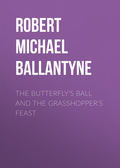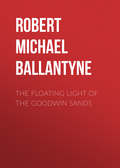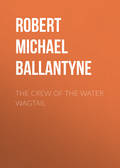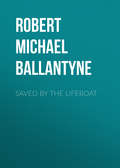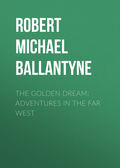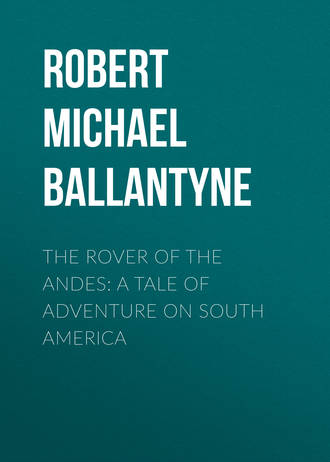
Robert Michael Ballantyne
The Rover of the Andes: A Tale of Adventure on South America
Chapter Eleven.
Outwitted by a Bandit
Early next morning Pedro went round and quietly roused his friends.
“We must start at once,” he said in a low voice to Lawrence, when the wearied youth was sufficiently awake to understand. “Your wounded arm is better, I hope?”
“It is only stiff and painful; happily, no bones are injured. But why such haste? I don’t like to leave my poor patients in this fashion.”
“Will any of them die if you don’t stay to nurse them?” asked the guide, with a grave, almost stern, expression.
“Why, no; not exactly,” returned Lawrence; “but many of them will want their wounds dressed, and all of them will be the better for a little more skilled attendance.”
“Will they not survive under ordinary attendance?” asked Pedro, with increasing severity of expression.
“Doubtless they will, but—”
“Would you like,” interrupted the inflexible guide, “to have them all roused up at this early hour to hear a little farewell speech from you, explaining the absolute necessity for your going away, and your extreme regret at leaving them?”
“Not if there is such necessity,” returned Lawrence, yawning, and raising himself on one elbow.
“There is such necessity, senhor. I have been down to the village where my friend lives, and have got fresh horses. Manuela and Quashy are already mounted. I let you sleep to the last moment, seeing you were so tired. Don’t forget your pistols; you may need them.”
Without waiting for a reply, he rose and left the room. The young doctor hesitated no longer. Regret at quitting the poor people around him was overborne by the fear of being left behind, for he had by that time begun to entertain a vague suspicion that the stern and peculiar man by whom he was led would not permit any object whatever to stand in the way of what he believed to be his duty.
In a few seconds he issued from the hut, armed with his pair of double-barrelled pistols and the faithful cudgel. The cavalry sabre, however, had been lost, not much to his regret.
The grey light of dawn was just sufficient to give a ghostly appearance to what may be truly termed the ghastly ruins around them, and to reveal in undefined solemnity the neighbouring mountains. Smoke still issued from the half-smothered fires, and here and there a spectral figure might be seen flitting silently to and fro. But all was profoundly still and quiet, even the occasional tremors of the earth had ceased for a time, when they issued from the enclosure of the hut.
Without speaking, Lawrence mounted the horse which stood ready for him, and they all rode silently away, picking their steps with great care through the upheaved and obstructed streets. It was a scene of absolute and utter ruin, which Lawrence felt could never be effaced from his memory, but must remain there burned in deeply, in its minutest details, to the end of time.
When they had passed the suburbs, however, and reached the country beyond, the depressing influences passed away, and, a certain degree of cheerfulness returning with the sun, they began to chat and to explain to each other their various experiences.
“Of course, when I felt the earthquake,” said Pedro to Lawrence, “I knew that, although little damage was done to the village to which I had gone in search of my friends, it must have been very severe on the town with its spires and public buildings; so I saddled up at once, and set off on my return. I met Quashy just as I left the village, and we both spurred back as fast as we could. When we came in sight of it, we saw at once that the place was destroyed, but, until we reached it, had no idea of the completeness of the destruction. We could not even find the road that led to the inn where we had left you and Manuela; and it was not till the following morning that we found the inn itself, and came up, as you know, just in time to help you, though we had sought diligently all night.”
“Das so, massa,” broke in Quashy, who had listened with glittering eyes to Pedro’s narrative, which of course was much more extended and full, “an’ you’s got no notion how we’s banged about our poor shins among dese ruins afore we founded you. S’my b’lief but for de fires we’d nebber hab founded you at all. And dem scoundrils—oh! dem scoundrils—”
Quashy’s feelings at this point failed to find vent in words sufficiently expressive, so he relieved them to some extent by shaking his fist at scoundreldom in general, and grinding his teeth. No words could have expressed his feelings half so well. By way of changing a subject that appeared to be almost too much for him, he turned abruptly to the Indian girl; and said, in Spanish quite as bad as that of Lawrence—
“But where were you, senhorina, all the time?”
“Ay, Manuela, let’s hear how it was that you escaped,” said Pedro quickly, in Indian.
“I escaped through the mercy of God,” replied the girl, in a low voice.
“True, Manuela, true,” replied the guide, “you never said a truer word than that; but by what means was His mercy displayed?”
“I can scarcely tell,” returned the girl; “when the earthquake came I was sitting on my bed. Then the wall of the room seemed to fall on me, and my senses were gone. How long I lay so, I cannot tell. When I recovered my mind I felt as if buried alive, but I could breathe, and although unable to rise, I could move. Then I heard cries, and I replied; but my strength was gone, and I think no one heard me. Then I prayed, and then, I think, I slept, but am not sure. At last I heard a spade striking the earth above me. Soon an opening was made, and I was dragged rudely out. The rest you know.”
On this being interpreted to her companions, Quashy gave it as his decided opinion that a miracle had been performed for her special deliverance; but Lawrence thought that, without miraculous interference, God had caused a mass of wall to fall over and protect her in much the same way that he himself had been protected.
While they were talking thus, and slowly descending one of the numerous richly-wooded, though rugged, paths which traverse the lower slopes of the Andes, they encountered a party of horsemen from the Pampas. They were well-armed, and from their looks might have been another troop of banditti, coming like human vultures from afar to swoop down on the carcass of the unfortunate town.
To have shown the slightest hesitancy or fear—supposing them to have been what they looked—would have been to invite attack, but, as the reader knows, our travellers were not the men to betray themselves thus. Before starting, they had carefully examined their weapons, and had bestowed them about their persons somewhat ostentatiously. Pedro had even caused Manuela to stick a brace of small pistols and a large knife in her belt; and, as Indian women are sometimes known to be capable of defending themselves as vigorously as men, she was by no means a cipher in the effective strength of the party.
With a dignified yet free-and-easy air that would have done credit to a Spanish Don of the olden time, Pedro saluted the party as he rode past. His aspect, and the quiet, self-possessed air of the huge Englishman, with the singularity of his cudgel, coupled with the look of graceful decision about the Indian maiden, and the blunt bull-doggedness of the square negro, were sufficient to ensure a polite response, not only from that party, but from several other bands of the same stamp that were met with during the day.
Diverging from the main road in order to avoid these bands, they followed a track well-known to the guide. Towards the afternoon, from the top of a rising ground, they descried a solitary foot traveller wending his way wearily up the hill.
He was a man of middle age, and powerfully-built, but walked with such evident difficulty that it seemed as if he were either ill or exhausted. Pedro eyed him with considerable suspicion as he approached. In passing, he begged for assistance. As he spoke in French, Lawrence, whose sympathies, like those of Quashy, were easily roused, asked in that tongue what was the matter with him.
He had been robbed, he said, by that villainous bandit, Conrad of the Mountains, or some one extremely like him, and had been nearly killed by him. He was on his way to San Ambrosio, where his wife and family dwelt, having heard that it had been greatly damaged, if not destroyed, by an earthquake.
“It has been utterly destroyed, my poor fellow,” said Lawrence, in a tone of pity; “but it may be that your family has escaped. A good number of people have escaped. Here are a few dollars for you. You will need them, I fear. You can owe them to me, and pay them when next we meet.”
The gift was accompanied with a look of pleasantry, for Lawrence well knew there was little chance of their ever meeting again.
Pedro sat regarding them with a grim smile. “You are a stout fellow,” he said, in a tone that was not conciliatory, after the beggar had accepted the dollars with many expressions of gratitude; “from all I have heard of Conrad of the Mountains, you are quite a match for him, if he were alone.”
“He was not alone, senhor,” replied the beggar, with a look that told of a temper easily disturbed.
To this Pedro replied contemptuously, “Oh, indeed!” and, turning abruptly away, rode on.
“You doubt that man?” said Lawrence, following him.
“I do.”
“He looked honest.”
“Men are not always to be judged by their looks.”
“Das a fact!” interposed Quashy; “what would peepil judge ob me, now, if dey hoed by looks?”
“They’d say you were a fine, genial, hearty, good-natured blockhead,” said Lawrence, laughing.
“True, massa, you’s right. I’m all dat an’ wuss, but not always dat. Sometimes I’m roused; an’ I’m awrful w’en I’m roused! You should see me w’en my back’s riz. Oh my!”
The negro opened his eyes and mouth so awfully at the mere idea of such a rising that his companions were fain to seek relief in laughter. Even the grave Manuela gave way to unrestrained merriment, for if she failed to thoroughly understand Quashy’s meaning, she quite understood his face.
That night they found welcome shelter in a small farm.
“Did you fall in with the notorious bandit, Conrad of the Mountains?” asked their host, after the ceremonious reception of his guests was over.
“No, senhor,” answered Pedro. “Is that fellow in this neighbourhood just now?”
“So it is said, senhor. I have not seen him myself, and should not know him if I saw him, but from descriptions I should think it must be he. I have a poor fellow—a peon—lying here just now, who has been robbed and nearly murdered by him. Come, he is in the next room; you can speak to him.”
Saying this, the host introduced Pedro and Lawrence into an inner chamber, where the wounded man lay, groaning horribly. He was very ready, indeed eager, to give all the information in his power. Fear had evidently given the poor fellow an exaggerated idea of the appearance of the man who had waylaid him; nevertheless, from his description our travellers had no difficulty in recognising the poor bereaved beggar whom they had met and assisted.
“Was he a large man?” asked Pedro.
“Yes, yes, senhor; tremendous!—seven feet or more, and so”—indicating about three feet—“across the shoulders. Rough black head, huge black beard and moustache, hawk nose, with such awful eyes, and the strength of a tiger! I could never have been so easily overcome by one man if he had not been a giant.”
“You see,” said Pedro in English, turning to Lawrence with a smile, “the description tallies exactly, making due allowance for this poor fellow’s alarm. He must be a clever fellow this Conrad of the Mountains, for he has not only frightened a peon out of his wits, but roused the pity of an Englishman by asserting that he had been robbed by himself! Your charity, you see, was ill bestowed.”
“So, it seems we might have made this noted bandit prisoner if we had only known!” exclaimed Lawrence, who seemed more distressed at missing the chance of becoming an amateur thief-catcher than at misdirected charity. “But do you really think the fellow was Conrad of the Mountains?”
“I am certain he was not,” said Pedro.
“How do you know?”
“I have several grounds for my belief, but, even if I had not, I might easily judge from appearances. Conrad is said to be kind to women and children. The scoundrel we met with could not be kind to any one. Moreover, there is no clear proof that Conrad is a bandit, while this man certainly is one.”
“I’m sorry you seem so sure, because I should like much to be able to say I had seen this notorious fellow about whom every one appears to hear so much and to know so little.”
Although the bandit of whom we have just made mention was not Conrad of the Mountains, it may interest the reader to know that he was in truth a sufficiently notorious villain, named Fan, the captain of a band of twenty assassins, most of whom were escaped criminals from the prisons of Chili and Peru. Among other exploits, Fan once attacked the armed escort of a troop of mules conveying silver in bars from the mines to Chili. Fan and his men attacked them in a ravine so suddenly, and with such a deadly fire of musketry, that the few who survived laid down their arms at once, on the promise being made that their lives should be spared.
Banditti do not usually regard promises as binding. It would be surprising if they did. Fan made the survivors lie down on their faces, and was about to plunder the mules, when he changed his mind, and shot all the rest of the convoy in cold blood, except the last, who, seeing the fate that awaited him, leaped over a precipice, rolled down a steep slope many hundred feet deep, and, strange to say, escaped with his life. He then procured a dozen or two well-armed men, and returned to the scene of the robbery, but found that the robbers had flown with as much silver as they could carry, the remainder being scattered about on the road.
These miscreants were afterwards captured, but, owing to disputes between the Peruvian and the Chilian Governments, the former of whom had hold of, while the latter claimed, the robbers, they all escaped their merited punishment, and were set at large.
Chapter Twelve.
Thick Woods, Heat, Change of Scene, and Savages
We must change the scene now, and transport our reader to one of those numerous streams which convey the surplus waters of the Andes to the warmer regions of Bolivia, and thence, through many a wild, luxuriant wilderness and jungle, to the Parana river, by which they ultimately find their way to the sea.
It was approaching the afternoon of a very sultry day when Lawrence awoke from his midday siesta under an algaroba-tree, and slowly opened his eyes. The first object they rested upon was the brown little face of Manuela, reposing on a pillow formed of leopard skin. In those regions it was the practice, when convenient, to sling a network hammock between two trees, and enjoy one’s siesta in that. The Indian girl lay in her hammock, with her eyes shut, and her little mouth open,—not undignifiedly open, but just sufficiently so to permit of one seeing something of the teeth and tongue inside.
Fascinated apparently by the sight, a mite of a blue-bird with a golden head sat on the edge of the hammock close to the little mouth, and looked in. Evidently it was a bird of an inquiring disposition, for, having gazed for a considerable time with one eye, it turned its head, and gazed a longer time with the other. Quashy lay close to Lawrence, with his back towards him. The latter, observing that the cheek of the former was more lumpy and prominent than usual, raised himself on one elbow to look at him, and found that the lump was the result of an expansion of the mouth from ear to ear. He was wide awake, gloating over the proceedings of that little blue-bird, but he heard Lawrence move, and turning his head slightly round, whispered—
“Dat am berry funny—i’n’t it?”
The whisper slightly roused Manuela. She drew a long breath, vented a deep sigh, and effectually blew the blue-bird away.
At the same moment the whole party was roused by a wild and indescribable scream, followed by a magnificent flash of what seemed to be coloured fire.
In his half-sleeping condition, Lawrence, believing it to be the war-whoop of wild Indians, leaped up and grasped his cudgel, but nothing was to be seen save the grinning face of Quashy and the amused looks of Manuela and Pedro.
“Purrits,” remarked the negro, by way of explanation.
“What do you mean by purrits?” demanded Lawrence, half ashamed of his alarm.
“I mean what I says, massa,—purrits.”
“He means parrots,” said Pedro, with a grave smile, as he rose, and proceeded to fold up the poncho on which he had lain. “We’ve had many a song from these screamers, but I don’t remember ever seeing such a big flock come so near us, or scream so loud, before. They must have been attracted by your pretty face, Manuela, and could not help shouting with surprise at finding you asleep.”
Manuela laughed lightly as she stepped out of her hammock.
“They’ve just roused us in good time,” continued Pedro, looking up between the tree-tops at the sky, “for the hut of the tiger-hunter is a long way off, and I’m anxious to reach it before dark.”
In a few minutes the hammock and other camp equipage was conveyed to one of the native canoes, which lay close to the river’s bank, our travellers embarked, and ere long were far from the spot where the siesta had been taken.
In the afternoon they stopped for a little to refresh themselves with roasted parrot, chocolate, and biscuit.
Parrots are found everywhere and in great numbers in those regions between the Atlantic and Pacific. They live and travel in large flocks, and, as every one knows, they are remarkably fond of using their discordant voices, much to the annoyance of sensitive travellers. Fortunately such travellers do not often go to the wild regions of South America,—when they do, they soon become un-sensitive. When parrots assemble in a flock on the trees, they keep fluttering their wings with a tremulous motion, bending down their heads and chattering, young and old, without regard to each other or to harmony. Each seems bent on giving his own opinion in the loudest key, and pays no regard whatever to the opinions of others. There is something almost human in this!
It is a curious fact that, while the plumage of the parrots’ breasts is always gaudy and brilliant in the extreme, that of their backs is usually the colour of the general tone of the region they inhabit. In woods, where the bark of trees is chiefly bright yellow and green, their backs are of these colours. In the plains they are a mixture of green and brown, so that when skimming over a country they are not easily distinguished, but if they chance to come unexpectedly on travellers, they sheer off with a shriek, and expose their gaudy breasts to view.
The large flock that had so suddenly come on our friends while taking their siesta had turned off thus with a horrible scream, and revealed their gay breasts, on which the sun chanced to shine at the moment with great power, thus producing, as we have said, a splendid flash of colour.
“Massa,” inquired Quashy, as they sat in the canoe enjoying the cold meal and floating slowly with the stream, “which you likes best,—ros’ purrit or ros’ monkey?”
“Really, I’m not quite sure,” replied Lawrence; “it depends very much on appetite. If I’m very hungry, I prefer the one that comes first to hand. Which do you like best?”
“Well, I’s not kite sure needer. I t’ink sometimes dat monkey is best, but I can’t easy git ober de face.”
“How so, Quashy?”
“’Cause it am so like eatin’ a bit o’ my great-gran’moder.”
“Indeed!”
“Yes. You’s no notion how like dey all is to dat ole lady. You see, she was uncommon old. She come ob a long-lib race. Das whar’ it is. My moder was eighty-two, an’ my gran’moder was ninety-siven, an’ my great-gran’moder was a hun’r’d an’ sixteen, an’ dey was all alive togidder, an’ at fuss you couldn’ tell which was de oldest. Dey run neck an’ neck for a long time, but arter de great-gran’ one pass de hunr’ milestone—oh! she hoed ahead like a rattlesnake. De wrinkles an’ de crows’ foots, an’ de—de colour—jes’ like bu’nt leather! She lef’ de oders far behind, an’ looked like nuffin so much as dat poor little blear-eyed monkey you shot de oder day, what Senhorina Manuela say was so nice to eat. What! you un’erstan’ Ingliss?” added the negro, looking at the Indian girl, who had given vent to a half-suppressed giggle.
“Yes—leetil,” replied Manuela, without attempting further to restrain her mirth.
Quite pleased that his remarks should afford amusement, Quashy was about to launch out extensively on the “great-gran’moder” theme, when an exclamation from the guide checked him.
“Look, Senhor Armstrong,” he said, arresting the progress of the canoe by a slight turn of his paddle. “Yonder is a mode of fishing which no doubt is new to you.”
Pedro pointed as he spoke to a canoe which a sharp bend of the stream had just revealed to them. Its occupants were Indians. They were almost naked, and so intent on their occupation that the arrival of our travellers had not been observed. One of the Indians, a splendid specimen of muscular strength, stood up in the canoe with a bow and arrow in his hands and one foot on the gunwale, quite motionless. Suddenly he drew the bow, the arrow pierced the water without causing a ripple, and next moment a transfixed fish was struggling on the surface.
The fish was barely secured when the presence of strangers was discovered. An exclamation followed. Instantly the dark savage bent his bow, with the arrow pointed this time full at the breast of Pedro.
That worthy did not, however, seem much alarmed. He at once pushed out into the stream, and gave a shout which induced the savage not only to lower his bow, but to fling it into his canoe and throw up his arms with exclamations of surprise and joy.
“He knows you?” said Lawrence, looking back at Pedro, who sat in the stern of their canoe.
“Yes, he knows me. I am pretty well-known to most people in these regions. This is the tiger-hunter of whom I have spoken. His dwelling is not far-off.”
The meeting of the two friends was remarkably cordial, and it was evident to both Lawrence and Quashy that the white man and the brown were not only old friends, but more than usually fond of each other.
After the first salutations, both canoes were run to the bank of the stream, and when they had all landed, Pedro presented his friend to Lawrence, who shook hands with him in the English fashion.
“You have not mentioned your friend’s name,” said Lawrence.
“His name!” replied Pedro, with a laugh, “well, it is almost unpronounceable. Perhaps you had better call him by the name he goes by among his friends—Spotted Tiger, or, more briefly—Tiger.”
“Tell Spotted Tiger, then,” said Lawrence, “that I am happy to make his acquaintance.”
When the guide had translated this, and the Indian had returned a complimentary rejoinder, they continued to converse in the Indian tongue with much animation, and, on the part of Spotted Tiger, with some excitement. Of course Lawrence understood nothing, but he continued to watch the expressive features of the savage with interest, and observed, when their glances showed they were talking of Manuela, that Tiger first raised his eyebrows in surprise, and then smiled peculiarly.
“Strange,” thought Lawrence, “what can he mean by that? Perhaps he knows the chief, her father, but why look surprised and smile on that account? I wish Pedro was not so secretive. However, it’s his business, not mine!”
Consoling himself with this philosophic thought, Lawrence re-embarked with his friends, and, accompanied by Tiger, proceeded down stream till they came to a beautiful spot where the banks widened out into a small lake or pond. On its shores, under the cool shade of many trees, stood the hut of the savage.
The scenery here was more than usually beautiful, being diversified not only in form, but in its wealth and variety of trees, and twining parasites and graceful ferns, with, in one place, groves of tall trees covered with balls of wild cotton, as large as an orange, and, elsewhere, inextricable entanglements of gorgeously flowering creepers, such as the most vivid imagination would fail to invent or conceive. Behind one part of the scene the setting sun shone with intense light, turning all into dark forms, while in other parts the slanting rays fell upon masses of rich foliage, and intensified its colour.
In front of the hut a handsome Indian woman stood awaiting the arrival of her husband. She held in her arms a naked little ball of whitey-brown fat, which represented the youngest Tiger-cub of the family. Other cubs, less whitey, and more brown, romped around, while up in the trees several remembrancers of Quashy’s great-great-grandmother sat grinning with delight, if not indignation, at the human beings below.
After being hospitably entertained by the Indian with fish, alligator soup, roast parrot, and young monkey, the party assembled round a fire, kindled outside the hut more for the purpose of scaring away wild beasts than cooking, though the little Tiger-cubs used it for the latter purpose.
Then Pedro said to Lawrence—
“Now, Senhor Armstrong, I am going to ask you to exercise a little patience at this point in our journey. The business I have in hand requires that I should leave you for two or three days. I fully expect to be back by the end of that time, and meanwhile I leave you and Quashy and Manuela in good company, for my friend Spotted Tiger is true as steel, though he is an Indian, and will perhaps show you a little sport to prevent your wearying.”
“Very good, Pedro. I am quite willing to wait,” said Lawrence. “You know I am not pressed for time at present. I shall be very glad to remain and see what is to be seen here, and learn Spanish from Manuela.”
“Or teach her Angleesh,” suggested the girl, bashfully.
“Certainly. Whichever pleases you best, Manuela,” returned Lawrence.
“But s’pose,” said Quashy, with a look of awful solemnity at Pedro—“s’pose you nebber comes back at all! S’pose you gits drownded, or killed by a tiger, or shot by a Injin. What den?”
“Suppose,” retorted the guide, “that an earthquake should swallow up South America, or that the world should catch fire—what then?”
“Why den, we no care a buttin for not’ing arter dat,” replied the negro, promptly, “but if you don’ return, we nebber reach Buenos Ayres.”
“Never fear, Quashy. If I don’t return, Spotted Tiger will guide you safely there.”
That night Pedro and his friend left the hut in a canoe, lighted by a brilliant moon. Before morning the latter returned alone.
Meanwhile Lawrence had slung Manuela’s hammock between two trees, with a fire on either side, yet screened from the chief camp-fire by a thick bush, so that though close at hand, and under his protection, she occupied, as it were, a separate chamber of her own. His own hammock and that of Quashy—for they all used hammocks—were hung side by side a little nearer to the large fire.
Mr and Mrs Tiger, with all the little Tigers, finding their hut rather warm, came outside, and also made their beds beside their visitors.



